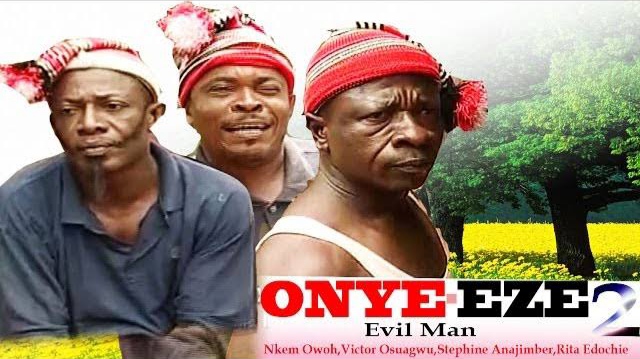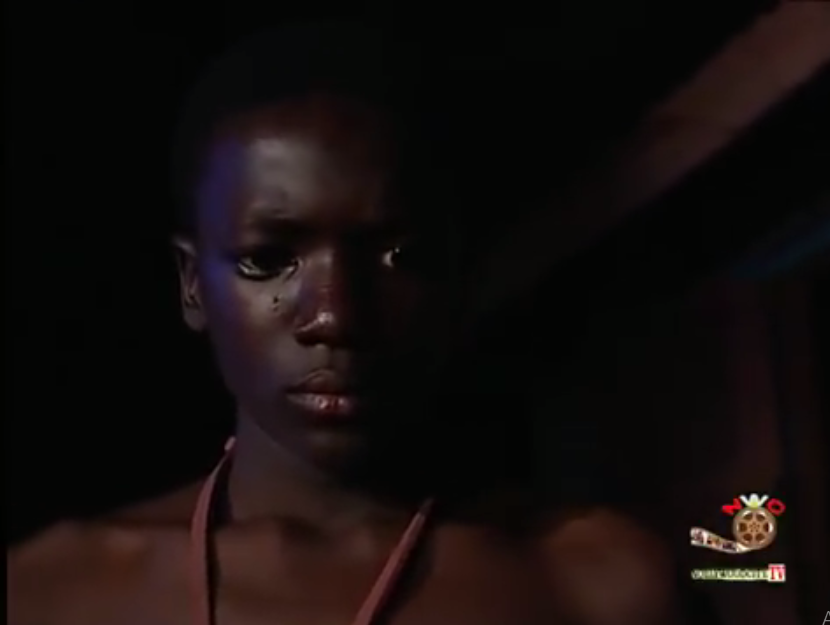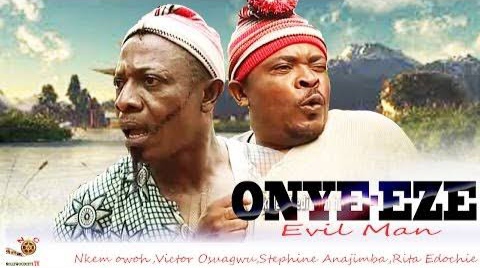Onye Eze: A Gift We Are Thankful For
By Tochukwu Precious Eze
- 28th June 2024

Sunny Collins and Tchidi Chikere worked together to make a few timeless films in the early 2000s. Top of that list, many would argue, is the renowned Nollywood classic, World Apart (2004), which starred Liz Benson, Hilda Dokubo, Charles Anwurum, and launched Ini Edo’s stellar career. World Apart was the fan favourite, in every sense of the word, and many Nollywood lovers still remember it today with fondness.
However, Onye Eze, a classic Nollywood comedy, appears to be more at risk of being forgotten. The film was shot in Igbo, after all, and at the time, we did not have the global appeal for movies shot in native languages as we do now. Be that as it may, Onye Eze is a gift that we should be thankful for; a piece of the Igbo identity and a wholesome viewing experience.
Released in 2001, Onye Eze was written by Sunny Collins and directed by Tchidi Chikere. It boasts of a star-studded cast led by Nkem Owoh (as Onye-Eze), featuring Victor Osuagwu, Hilda Dokubo, David Ihesie, Stephen Alajemba a.k.a Uwaezuoke and Rita Edochie, amongst others. The individual brilliance of these actors serves to make an excellent story into an ageless work of art.
When one thinks of what an Igbo movie should be, the first pointer is often language, which is one of the pillars of culture and identity. It is a logical stance that an Igbo film should be done in the Igbo language. We have seen various attempts in recent years to make Igbo films, and the majority of them appear ingenuine and inauthentic. The actors try too hard and it is evident.
Onye Eze has an effortless flow, an easy feel that gives the viewer a sense of home. To highlight its rich display of language, we find Adadiya, Onye Eze’s wife (played by Ogechi Obilonu), speaking a dialect distinct to the Owerri people of Imo State, while most of the other characters speak a more central version of Igbo. This, of course, is a balanced portrayal of the Igbo community, seeing as intermarriages and migration have made it so that we relate with each other in different dialects almost daily. And as a result, we have varying words and expressions diffused into our language.
It is almost without question that with the likes of Osuofia, Uwaezuoke, and Victor Osuagwu in one project, laughter and entertainment are guaranteed. These are actors who are natural and gifted both in their delivery and interpretation of roles. Movies from this era are known to be, among many things, innocent and untainted by politics, prejudice, and other agendas that have now found their way into the industry. Onye Eze makes good on this, presenting itself simply― innocently― as a story that represents a people, and hopes to entertain any and everyone who comes across it.
Onye Eze does remarkably well in terms of cultural depiction, though my most notable criticism of the story would be in the way that the traditional ruler is portrayed. Nneoma, a young lady who has committed a heinous crime, is brought before the Igwe of the community to be judged and sentenced. He declares that she is to be stoned to death by the villagers. It is noteworthy that the tragedy in this part is so palpable and consuming that you are bound to drop a tear, no matter how cold, or how hardhearted you are. And this is kudos to the cast and crew.
But while this goes on― Nneoma says her last words, her mother and brother sob, villagers mourn; an absolutely crushing scene― the Igwe appears unmoved, untouched, seemingly angered by their pleas. This is untypical of an Igbo traditional ruler. While we can argue that he had to do what needed to be done, he also did not have to be so cruel about it. A true Igwe would have acknowledged and sympathized with the pain of his people, even as he carried out his duties.
What I consider most appealing about classic Igbo stories, both in folklore and in more recent forms of storytelling, are the morals they carry and the values they promote. Onye Eze shows how people can be evil, but that is life as we know it. If there is good, there has to be an equal and opposite amount of evil. Yet life is a journey and our actions determine where we end up.
During a conversation with his friend, Onye Eze, having gone blind at this point of the film, says, “O buro aka melu, ife a bu ma melu (What has befallen me was not orchestrated by human hands; it came from the gods).” There is the consciousness that evil does not go unpunished, that the earth returns to us what we give out in good measure.
Moments before his tragic death, as he lays a curse on his wayward son, he remembers his days as a child: how he was a menace to his parents and how his current predicament was a manifestation of the words of his aggrieved mother. This brings us to feel a surge of sympathy for this character whom we have spent so long detesting. His long-anticipated death does not bring the satisfaction we envisioned. It is a subtle but remarkable arc in this character's journey. We are left with a heaviness we cannot define, a burning question: Is Ikenta (Onye Eze’s son) bound to suffer the same fate as his father?
 Ikenta, played by Chukwudi Okoro
Ikenta, played by Chukwudi OkoroOverall, the film is a thrill to watch. When in search of a piece of home spiced with humour, tragedy, and thought-provoking themes, an entire experience, Onye Eze, is a good place to start. It is a gift that we, the Igbo people, should cherish and hold on to for as long as we can. Even as years go by, this art lives on, ever ready to inspire, to entertain and to be felt.


